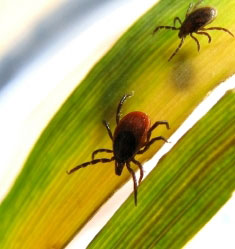
Ticks climb onto weeds, grasses or bushes and lie in wait. Photo: iStock
Ask The Professor
What can I do to protect my pets—and my family—from ticks?
Michael Stone, staff veterinarian at the Foster Hospital at the Cummings School of Veterinary Medicine, gives us the scoop:
Most pet owners are concerned about the presence of ticks on their animals and themselves. As my 8-year-old daughter says, “They’re gross!” Unfortunately, tick control is more difficult than flea control. Even with the use of anti-tick products, you’ll still find an occasional tick on your pet’s coat. Adult ticks can be found throughout the coat, but most commonly migrate to the ears, around the neck or between the toes.
Ticks do not jump onto hosts or drop out of trees. They climb onto weeds, grasses or bushes and wait for passing hosts to brush against the vegetation. They lie in wait, with their forelegs extended, and when a plant is touched, the ticks grab hold. Limiting exposure to tall vegetation may lessen the opportunity for ticks to hitch a ride on you or your pet.
There are several safe and effective ways to control canine ticks, including a collar and products applied monthly to the skin. For cats, controlling ticks is especially difficult because many canine products are toxic for cats. Use extreme caution if you have a cat and a dog at home. We have seen several ill cats at the hospital that had been around dogs. Whether a cat has to lick the product or simply rub against the dog is unknown. Consult your veterinarian about which anti-tick product will work best for your pet, and be sure to follow the label directions carefully.
Now, how about removing ticks? Although several tick detachment devices are available, I recommend grasping the tick as close to the skin as possible and slowly pulling straight out. Avoid twisting or crushing the tick. Leaving mouth parts of the tick in the host may result in mild redness or crustiness but is usually of little concern. Applying fingernail polish, alcohol or petroleum jelly is ineffective. Direct heat, such as cigarettes or lighters, should never be used to remove a tick.


